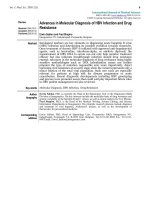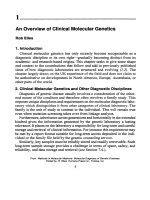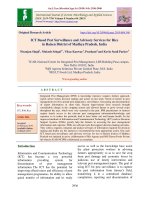Molecular diagnosis of a cutaneous form of pox in pigeons at Mhow in Madhya Pradesh, India
Bạn đang xem bản rút gọn của tài liệu. Xem và tải ngay bản đầy đủ của tài liệu tại đây (236.07 KB, 6 trang )
Int.J.Curr.Microbiol.App.Sci (2018) 7(9): 1318-1323
International Journal of Current Microbiology and Applied Sciences
ISSN: 2319-7706 Volume 7 Number 09 (2018)
Journal homepage:
Original Research Article
/>
Molecular Diagnosis of a Cutaneous Form of Pox in Pigeons
at Mhow in Madhya Pradesh, India
S.D. Audarya1*, T. Riyesh2, N. Kumar2, D. Chhabra1, R. Sikrodia1,
R. Sharda1, S. Barua2 and U.K. Garg3
1
Department of Veterinary Microbiology, College of Veterinary Science and Animal
Husbandry, Nanaji Deshmukh Veterinary Science University, Mhow-453446,
Madhya Pradesh, India
2
National Center for Veterinary Type Cultures, Indian Council of Agricultural ResearchNational Research Center on Equines, Sirsa Road, Hisar-125001, Haryana, India
3
Department of Veterinary Pathology, College of Veterinary Science and Animal Husbandry,
Nanaji Deshmukh Veterinary Science University, Mhow-453446, Madhya Pradesh, India
*Corresponding author
ABSTRACT
Keywords
Avian pox, P4b
gene, PCR, Pigeon
Article Info
Accepted:
10 August 2018
Available Online:
10 September 2018
Avian poxviruses cause pox in different kind of birds. In the present study, investigations
of a cutaneous form of pox in pigeons were reported. In June 2017, a Pigeon showing
clinical lesions of yellowish crust/nodules on and around beak and eyes and feet was
observed in a scattered group of around 40 pigeons. Lesions were collected aseptically in a
container with 50% glycerol phosphate buffer solution. After processing of clinical
specimen the inoculums were inoculated into chicken embryonated eggs by using
chorioallantoic membrane route. Viral deoxyribonucleic acid was extracted and used in
Avipox virus specific polymerase chain reaction. No specific lesions were observed in
inoculated chicken embryonated egg even after third passage. However, in polymerase
chain reaction Avipox virus specific P4b gene (578 bp) was successfully amplified and
visualized in 1% agarose gel on electrophoresis. Clinical signs and amplification of
Avipox virus specific gene confirmed cutaneous form of Pox in Pigeons at Mhow in
Madhya Pradesh.
Introduction
Avian poxviruses infect domestic and wild
birds (Carulei et al., 2017). As many as 278
species from 70 families in 20 orders of birds
including pigeons are affected by poxviruses
naturally. Large poxviruses are double
stranded enveloped DNA viruses. These
poxviruses are categorized into the genus
Avipoxvirus
of
the
Chordopoxvirinae
subfamily in the Poxviridae family. There are
13 recognised species in the genus
Avipoxvirus (WHA, 2012). Avian pox occurs
frequently in domestic poultry, pigeons and
canaries (Mayahi and Talazade, 2010).
Pigeons are members of the order
Columbiforme and domestic pigeon is known
as Columba livia. Pigeon pox infections
1318
Int.J.Curr.Microbiol.App.Sci (2018) 7(9): 1318-1323
caused by the pigeon poxvirus in the subgroup
Avian poxvirus generally exhibit two forms:
cutaneous (dry-discrete scabby lesions on
unfeathered parts of the body especially the
beak and eyelids) and diphtheritic (wetfibronecrotic diphtheritic lesions in the
oropharynx). The incubation period is 7-9
days. Usually lesions heal in 3-4 weeks except
diphtheritic lesions may persist for months.
Poxviruses are present in the scabs and
because they are resistant to drying, remain
stable in the environment. Though a selflimiting disease, at times because of lesions
which are painful and infections due to
secondary bacteria it may interfere with bodily
functions. Scabs when removed forcibly may
result in bleeding and deformity. The Pigeon
poxvirus enters the body through the mucous
membranes or wound to the skin.
The Pigeon poxvirus is transmitted primarily
by direct contact through fighting, feather
picking or indirectly by mosquitoes bites. Due
to localization of the virus at point of entry it
may cause localised infection. When the virus
spread through blood to the liver and bone
marrow, there may be a systemic infection
(Doneley, 2006). In severe cases affected birds
die within 10-20 days on catching the
infection. Mild cases are found in small
percentage of birds and they usually recover.
Recovered birds are immune. Young affected
birds
surviving
the
disease
remain
underdeveloped and never recover to their full
strength (Graham and Barger, 1935). In the
present study investigations of a cutaneous
form of Pox in Pigeons at Mhow in Madhya
Pradesh was reported.
Materials and Methods
453446, Indore, Madhya Pradesh. From a
scattered group of 40 pigeons (some are
having nests inside the buildings), 2
mortalities were recorded and an affected
pigeon was spotted in the lobby of the main
buildings on Thursday, 1st June 2017 in the
evening hours.
Collection and storage of clinical samples
Nodules/scabs on and around the beak and
feet were collected aseptically and pooled in a
sterile container with 5 ml of 50% glycerol
phosphate buffer solution. The collected
samples were stored at +4°C.
Processing of specimen and storage
Pooled samples were taken out from the
refrigerator and placed in the mortar
containing 10 ml of phosphate buffer saline
solution and sterile glass beads with
antibiotics at room temperature. After grinding
it with the pestle, the resultant mixture was
centrifuged at 3000 rpm for 5 min at +4°C.
The supernatant was placed in the sterile
centrifuge tube and kept at -20°C in the deep
freezer at the Veterinary Microbiology
departments in the College of Veterinary
Science and Animal Husbandry, Mhow and
College of Veterinary Science, Hisar.
Inoculation of chicken embryonated eggs
For the study, chicken embryonated eggs of
Kadaknath birds were procured from
Kadaknath poultry unit of Poultry Science
Department of the College and also in Specific
Pathogen Free (SPF) chicken embryonated
eggs at National Center for Veterinary Type
Cultures.
Pigeons
Pigeons are generally spotted roosting in and
around the buildings of College of Veterinary
Science and Animal Husbandry, Mhow-
The eggs were observed under egg Candler
and viable eggs were incubated. Viable eggs
of 10 days old were used in the present
investigation.
1319
Int.J.Curr.Microbiol.App.Sci (2018) 7(9): 1318-1323
Transport of samples to National Center
for Veterinary Type Cultures
Agarose
gel
electrophoresis
documentation of the results
Supernatants resulting after the processing of
specimen were handed over to and scabs were
sent by speed post under cold chain
conditions.
The amplified Avipox gene specific
deoxyribonucleic acid products in PCR were
run in 1% agarose gel electrophoresis to find
out the positive samples. The results obtained
on completion of agar gel electrophoresis were
recorded and documented using gel
documentation system.
Recovery of Avipox virus
Virus (es) were recovered from the clinical
specimens in Minimum Essential Medium
(MEM, Sigma, Steinheim, Germany) and
filtered through 0.45 µm filter.
Extraction of viral deoxyribonucleic acid
(DNA)
The viral DNA was extracted using Viral
RNA/DNA Purification Kit (Thermoscientific,
Vilnius, Lithunia).
Primers
Following primers were used to amplify 578
bp fragment of DNA polymerase gene of
Avipox
virus; forward
primer:
5’CAGCAGGTGCTAAACAACAA-3’
and
reverse
primer:
5’CGGTAGCTTAACGCCGAATA-3’
(Huw
and Hwa, 1997; Masola et al., 2016).
Avipox-specific polymerase chain reaction
For amplification of Avipox-specific P4b gene
in PCR, each reaction tube of 20 µl contained
10 µl of 2X PCR master mix (Promega,
Madison, USA), 20 pmol of forward and
reverse primers and 2 µl of DNA (template).
The thermocycler conditions were as follows:
a denaturation step of 5 min at 95°C followed
by 38 cycles of amplification (30 sec at 95°C,
30 sec at 55°C, and 30 sec at 72°C), and a
final extension step at 72°C for 10 min.
Positive, negative and no template controls
were kept in the experiment.
and
Results and Discussion
Cutaneous form of avian pox in pigeons was
reported from Andhra Pradesh and lesions
noticed were round, nodular, greyish white
eruptions around the eye, on the beak, skin,
legs and around the cloaca of affected birds
(Hemanth et al., 2014). Recently concurrent
occurrence of cutaneous and diphtheritic
forms of pigeon pox disease was reported
from Srinagar, Jammu and Kashmir. Scattered
multifocal firm grayish white nodules were
seen around the eyes, beak and both the legs in
a pigeon pox affected Pigeon. And also there
were multiple light yellowish nodules
observed on the mucosa of mouth, pharynx
and larynx (Jan et al., 2017).
Similar lesions are observed in the present
investigation but only of cutaneous form of
pigeon pox (Fig. 1). In another study
cutaneous form of pox in a flock of pigeons at
Kadapa district of Andhra Pradesh and its
successful therapeutic management with
azithromycin was reported (Sudhakara and
Sivajothi, 2017). Similarly oral administration
of Acyclovir @ 80 mg/kg every 6 hr for 10
days in canaries was used to treat Canary pox.
Therapeutic management of the affected bird
in the present investigation was not possible
since it died very soon.
Beaudette and Hudson in 1938 discovered that
pigeon-pox virus can be grown readily in eggs
by serial passage.
1320
Int.J.Curr.Microbiol.App.Sci (2018) 7(9): 1318-1323
Fig.1 Pigeon showing clinical signs of Avipox (Pigeon pox) A) Yellowish crust/nodules on and
around the beak, over and under the left eye B) Lesions on right side of the pigeon on the beak
and around the eye C) Lesions on feet
(A)
(B)
(C)
Fig.2 Amplification of Avipox virus specific gene (Wells: 1-100 bp marker, 2-Positive control,
3-No template control, 4-Negative control, 5, 6, 7-Samples, 578 bp)
In one of the other studies, generalized white
foci and oedematous thickening were
recorded after first passage and subsequent
passages led to pock size of about 2-5 mm in
diameter along with haemorrhage congestion
and necrosis (Khan, 2014) in embryonated
chicken eggs. However in our study even
after three blind passages in SPF eggs and one
in desi Kadaknath bird’s embryonated eggs
no specific lesions were observed in
inoculated embryonated chicken eggs.
Similarly, Tanzanian strain of pigeon pox
virus isolated from domestic pigeon is not
pathogenic in chickens (Masola et al., 2016).
So further studies are planned to know
whether the Pigeon pox virus in the study
adapt to the embryonated chicken eggs with
or without any lesions (Bayati, 2017).
1321
Int.J.Curr.Microbiol.App.Sci (2018) 7(9): 1318-1323
Pigeon pox vaccines in healthy fowls produce
modified form of immunity against fowl pox
which may be demonstrated as soon as two
weeks following vaccination. Pigeon pox
vaccine is used with less risk than fowlpox
vaccines as fowlpox vaccines are associated
with systemic reaction and temporary loss of
egg production in chickens (Graham and
Barger, 1935). But the immunity produced by
Pigeon pox vaccines is limited and after 3
months it decreases (Haig et al., 1951).
Isolation of the Pigeon pox virus from the
specimen
collected
in
the
present
investigation is planned to study host
specificity of the virus to the Pigeons and
Chickens. As in one of the study field isolates
of Pigeon pox virus and fowl pox virus from
Bangladesh exhibited considerable host
specificity (Siddique et al., 2011).
In the present study successful amplification
of Avipox-specific P4b gene from scabs taken
from the affected pigeon in polymerase chain
reaction further confirmed the avian pox viral
infection (Fig. 2). All avian poxvirus genomes
differ from other poxvirus genomes (Carulei
et al., 2017). So in future after isolation of
Pigeon pox virus whole genome sequencing
of the Pigeon pox can be attempted to
understand genetic features of the isolate.
Vaccines against Pigeon pox are administered
by follicle method and subcutaneous
injection. Presently Chevipok® vaccine by
chevita GmbH is administered in young
pigeons (9th week of age) by any of the above
methods and in adult pigeons (5 weeks before
mating, follicle method and 3 weeks before
mating (subcutaneous injection). In case of
follicle method annual booster vaccination is
desirable. The immunity develops 21 days
post subcutaneous injection of the vaccine
and minimum duration of appreciable
immunity is for up to 9 months duration.
Another Pigeon pox vaccine (chicken embryo
propagated, freeze dried, live virus vaccine)
from
Hygieia
biological
laboratories,
California is available for immunization in
chickens but not for Pigeons. Colombovac®
PMV/pox from zoetis and Medipox vaccine
from Medpet is available. In India though
fowl pox vaccines are produced, no such
vaccines against Pigeon pox are produced or
available commercially. Hence in future, if
Pigeon pox virus is successfully isolated then
it can be used in preparation of vaccine. More
than 40 types of parasites live either on the
birds or in the places they roost and are
responsible for transmission of infectious
agent including pox (Bahrami et al., 2013).
Besides vaccination, isolation of diseased
pigeons, preventing mosquito biting are
effective measures for prevention and control
of Pigeon pox. The present investigation
reports cutaneous form of pox in Pigeons and
further it is confirmed by successful
amplification of Avipox-specific P4b gene in
polymerase chain reaction test.
Acknowledgements
The author expresses deepest gratitude and
reverence to Late Dr. U.K. Garg, Dean for
spotting the affected bird and informing.
Thanks are due to Dr. L. Chauhan (for
providing chicken eggs), Mr. R. Chauhan (for
catching and holding the bird safely for
photography) and to Dr. N.K. Kakker, Dr. R.
Chhabra and Dr. D. Sharma (for their help in
storage and transportation of the samples at
Hisar).
References
Bahrami, A.M., Hosseini, E. and Razmo, M.
2013. Important parasite in pigeon, its
hematological parameter and pathology
of intestine. W. Appl. Sci. J., 21(9):
1361-1365.
Bayati, H.A.M.A. 2017. Virological study
about Avipox virus in local birds of
Iraq. Int. J. Sci. Res., 6(6): 766-769.
1322
Int.J.Curr.Microbiol.App.Sci (2018) 7(9): 1318-1323
Beaudette, F.R. and Hudson, C.B. 1938.
Cultivation of pigeon pox virus on the
chorioallantoic membrane. J. Am. Vet.
Med. Assoc., 93(3):146-150.
Carulei, O., Douglass, N. and Williamson,
A.N. 2017. Comparative analysis of
avian poxvirus genomes, including a
novel poxvirus from lesser flamingos
(Phoenicopterus minor), highlights the
lack of conservation of the central
region. BMC Genomics, 18: 1-13
Doneley, B. 2006. Pigeon medicine and
surgery. The North American veterinary
conference. Exotics-Avian, pp. 15251530.
Graham, R. and Barger, E. 1935. Fowl pox.
Circular 430, University of Illinois,
College of Agriculture: Agricultural
experiment station and extension
services. Pp14.
Haig, D.A. 1951. Fowl-pox vaccination in
South Africa with egg propagated fowl
and pigeon pox viruses. Onderstepoort
J. Vet. Res., 25(1): 17-29.
Hemanth, I., Amravathi, P., Sasidhar, B.N.,
Anand, K.A. and Sailaja, N. 2014. An
outbreak of cutaneous form of avian
pox in pigeons (Columbia livia). Int. J.
Sci. Environ., 3(4): 1484-1488.
Huw, L.L. and Hwa, L.K. 1997. Application
of the polymerase chain reaction for the
diagnosis of fowl poxvirus infection. J.
Virol. Methods, 63: 113-119.
Jan, A., Shah, O.S., Moona, S.M., Ali, R.,
Rasool, S. and Asfar, A. 2017.
Concurrent occurrence of cutaneous and
diphtheritic form of pigeon pox in
pigeon (Columbia spp.) and its
successful amelioration by garlic and
honey. The Pharma Innov. J., 6(12):
494-495.
Khan, F.F. 2014. Studies on field strain of
pigeon pox virus and its comparison
with field and vaccine strains of fowl
pox virus. MVSc. Thesis submitted to
Department
of
Veterinary
Microbiology, College of Veterinary
and Animal Husbandry, Chattisgarh
Kamdhenu Vishwavidyalaya, Anjora,
Durg.
Masola, S.N., Mzula, A., Kasanga, C.J. and
Wambura, P.N. 2016. Evaluation of
virulence of Tanzanian strains of
fowlpox and pigeonpox viruses in
chickens. Br. Biotechnol. J., 10(1): 110.
Mayahi, M. and Talazade, F. 2010. Case
report: treatment of canary pox with
orally administration of Acyclovir. J.
U.S.-Chin. Med. Sci., 7(4).
Siddique, A.B., Hossain, M.A. and Zinnah,
M.A. 2011. Determination of host
specificity of pigeon pox and fowl pox
viruses isolated from a field outbreak.
Bulgarian J. Vet. Med., 14(4): 2019214.
Sudhakara, R.B. and Sivajothi, S. 2018.
Therapeutic management of cutaneous
form of pox in pigeons with
azithromycin. Int. J. Avian Wildl. Biol.,
3(3): 143-144.
Wildlife health Australia. 2012. Poxviruses
and Australian Wild birds, Fact sheet, 16.
How to cite this article:
Audarya, S.D., T. Riyesh, N. Kumar, D. Chhabra, R. Sikrodia, R. Sharda, S. Barua and Garg,
U.K. 2018. Molecular Diagnosis of a Cutaneous Form of Pox in Pigeons at Mhow in Madhya
Pradesh, India. Int.J.Curr.Microbiol.App.Sci. 7(09): 1318-1323.
doi: />
1323









